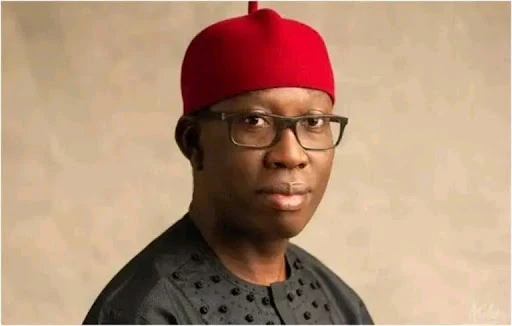November 8, 2024
The Economic and Financial Crimes Commission’s (EFCC) recent arrest of former Delta State Governor Ifeanyi Okowa is a stark reminder of the deep-seated corruption and economic mismanagement that have left many in Delta State impoverished while those in power allegedly amass unimaginable wealth. Ifeanyi Okowa, who governed Delta from 2015 to 2023, stands accused of siphoning N1.3 trillion in 13% derivation funds meant to uplift Delta’s oil-producing communities and drive development across the state. Instead, these funds are alleged to have been redirected to luxurious personal properties in Abuja, Asaba, and other undisclosed locations, leaving the state’s poorest residents to struggle in worsening conditions.
During his eight-year tenure, Okowa presided over a period of vast financial inflows into Delta State. The 13% derivation funds, a federal allocation aimed at supporting oil-producing regions, brought in billions annually—resources meant to improve infrastructure, boost economic growth, and provide essential social services to communities long impacted by the oil industry’s environmental toll. Yet, despite these vast financial resources, the people of Delta saw little progress. Schools remain underfunded, hospitals are lacking in even basic supplies, and roads throughout the state are in disrepair.
One of the most troubling allegations centers around Okowa’s handling of a N40 billion investment in the UTM Floating Liquefied Natural Gas project, a venture he promoted as a game-changer for Delta’s economy. However, investigators now claim that much of this fund was rerouted into opaque transactions and, in some instances, diverted entirely from its original purpose. This has raised questions about the transparency and accountability within Okowa’s administration, casting a shadow over his claims of economic progress.
Under Okowa’s watch, the financial mismanagement extended to everyday governance. Civil servants in Delta State went unpaid for months on end, pensioners were left without their retirement benefits, and public infrastructure continued to decay. Meanwhile, Delta’s debt burden ballooned, saddling future generations with liabilities incurred under questionable circumstances. For many, Okowa’s legacy is not one of development, but of squandered potential and promises broken to a generation that deserved better.
The pain of this mismanagement is felt most acutely in the state’s oil-producing communities, where residents in areas like Urhobo, Itsekiri, Ijaw, Isoko, and Ndokwa live amidst pollution, ecological destruction, and severe underdevelopment. These communities have long grappled with the environmental fallout of oil extraction—ranging from polluted water sources to soil degradation—yet the funds designated to compensate and support these communities appear to have vanished under Okowa’s administration. Delta State Oil Producing Areas Development Commission (DESOPADEC), an agency created to facilitate development in oil-producing regions, has been heavily criticized for its inability to deliver meaningful change, further fueling residents’ frustration.
The alleged misappropriation under Okowa’s administration has placed a spotlight on his successor, Governor Sheriff Oborevwori, who took office in May 2023. As Speaker of the Delta State Assembly from 2017 to 2023, Oborevwori was in a position to question and investigate Okowa’s use of public funds but failed to do so. Now, as governor, Oborevwori finds himself under increasing scrutiny as the public demands accountability not only for Okowa’s actions but also for his administration’s own handling of the state’s finances. Despite the state receiving over N239.6 billion in derivation funds between June 2023 and July 2024, there has been no substantial improvement in infrastructure, healthcare, or education.
Many Delta residents worry that Oborevwori’s administration is following the same path of neglect and financial impropriety, with development projects either stalled or uncompleted, and the state’s wealth remaining concentrated among a select few. This cycle of governance has led to growing resentment and frustration among the populace, who feel they have been systematically deprived of the resources that should have lifted them out of poverty.
Delta’s economy, despite its oil wealth, has become emblematic of a national problem in Nigeria, where public resources are routinely embezzled while citizens are left to bear the brunt of poverty, underemployment, and decaying public infrastructure. The social consequences of this economic disparity are severe: the lack of investment in healthcare has resulted in preventable diseases running rampant, while education remains underfunded, limiting opportunities for the youth. As a result, Delta’s young population, instead of being empowered by oil wealth, faces limited prospects and an uncertain future.
Environmental degradation has compounded the situation, especially in rural communities. For decades, oil spills, gas flaring, and industrial waste have polluted waterways and farmland, creating a toxic environment that has severely impacted local livelihoods. Farmers and fishermen in the Niger Delta, once dependent on the land and sea for their survival, have been forced to abandon their traditional ways of life. The government’s failure to address these issues, despite the funding available, underscores the disconnect between the political class and the citizens they are meant to serve.
The EFCC’s ongoing investigation into Okowa’s financial dealings represents a crucial step in addressing this pattern of exploitation. Many citizens are calling for a comprehensive audit of the state’s finances, including DESOPADEC and other agencies responsible for managing public funds. The ultimate goal, they argue, should be not only to bring those who have allegedly misappropriated funds to justice but to create a governance structure that prioritizes transparency, accountability, and the welfare of the people.
Abuja Network News will continue to follow this developing story as calls for transparency and justice grow louder. Delta’s citizens deserve answers, and they deserve leaders who are committed to serving the public, not themselves. The tragedy of Delta’s poverty amidst vast wealth is a narrative all too common in Nigeria, but it is one that must end if the state—and indeed the nation—is to move forward toward a more equitable future.
Abuja Network News
Tags
Editorial

